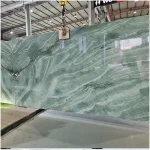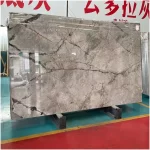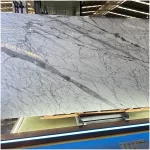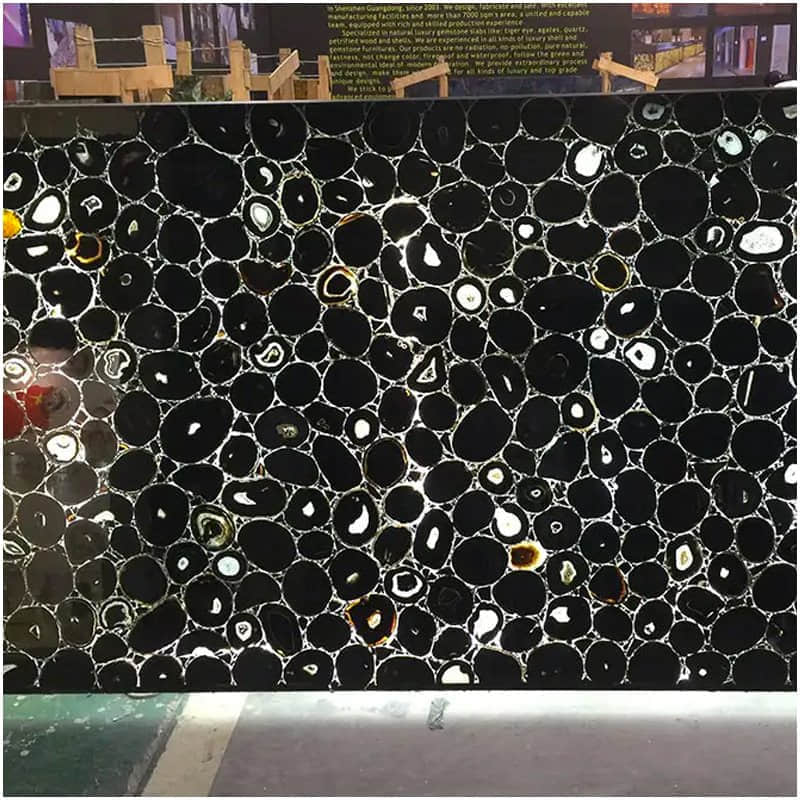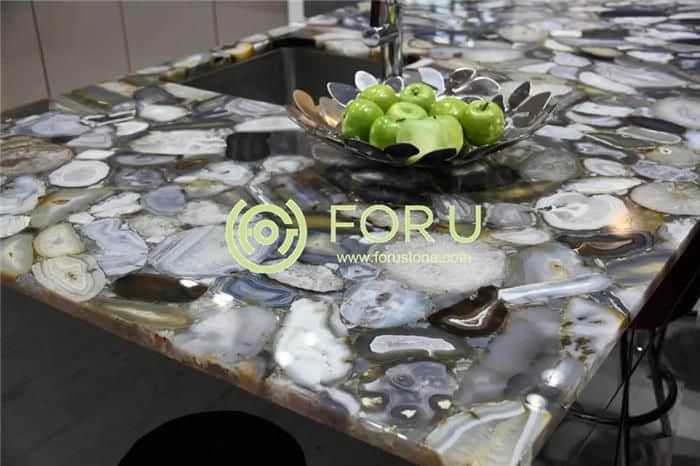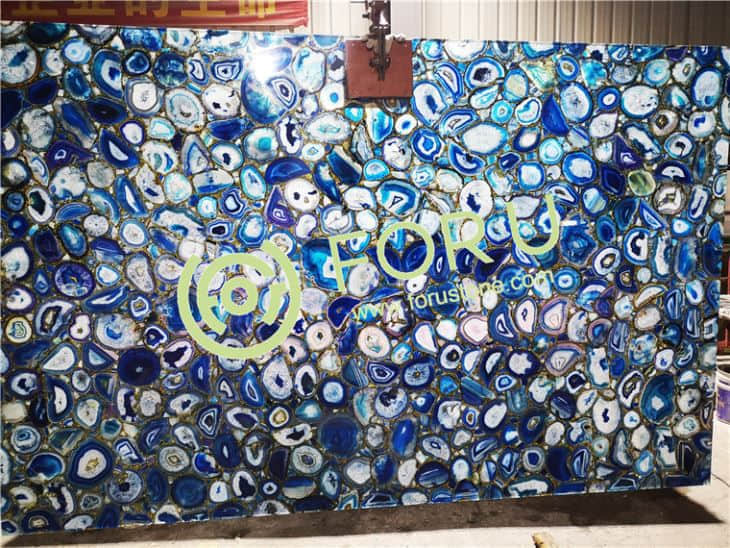Introduction
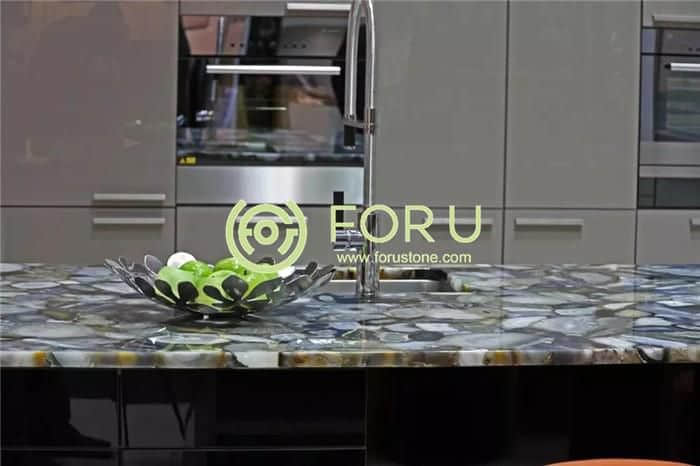
With people trying to get their kitchens and bathrooms done up in an exquisite and aesthetic manner, agate slab countertops are coming up as a pretty choice for the homeowner and the designer. Renowned for their marvelous patterns and rich colors, agate slabs countertops assure great utility for not only eyes that seek but also require perfection. However, while going for such an attractive material, durability is the prime factor. This discussion would like to pursue whether agate slab countertops can stand daily routine wear and tear, comparing with the same in the case of traditional materials like granite and quartz. We will, however, look into their material makeup, wear and tear resistance, as well as maintenance requirements to make a judgment call on whether their usability is just as good as the overall aesthetic.
Composition and Properties of Agate
Agate is a type of cryptocrystalline quartz that is distinguished by its fineness of grain and brightness of color. Agate is commonly formed by the deposit of silica from solute-containing groundwater, percolating into air pockets in cooling lava. Its unique banding pattern is a result of periodic changes in pressure or mineral content during its formation.
Physical Properties
Along with this, the mentioned few physical properties make agate a fairly good choice for countertops. With a Mohs scale of mineral hardness at 6.5-7, agate is relatively lower than granite but in comparative values very close to commercial marble. This certainly goes on to suggest that, while agate does exhibit a high amount of resistance to scratch and wear from everyday kitchen items, the danger still always lurks of a stone getting scratched from harder items. The density makes the stone slightly more porous than marble, and it has a resistance to staining, needing sealing treatments infrequently.
Its durability as an actual countertop, though, depends largely on the treatment received and the finish applied during manufacture, which can either enhance the natural strength or not.
Then, compare that to other household favorites, and you’ll get a very good sense of how this plays out in a busy home.
Comparison with Other Countertop Materials Their look is actually unique among the world of kitchen and bathroom designs through agate slabs. To be able to get the understanding done by homeowners, the respect with respect to their uniqueness compared to much more conventional material is a must. Let us examine how agate compares to granite, quartz, and marble, which rank the top three popularly sought-after materials for countertops, in the following categories.
Granite
In this regard, one could note that the durability and easy maintenance of granite stand out. This ranges on Moh’s scale between 6 and 7, just like agate. However, granite does generally contain the hardness of the material uniformly throughout; that may give a slight edge in overall durability and resistance to scratching. The colors were uniformly of equal lightness, and the darkness of the depth was uniformly of equal darknessness. Other deterministic factors might come into play, such as the intricate fine patterns of agate, for aesthetic preference. In porosity, both materials need sealing from stains, but granite may need it less often, basing on the exact type.
Quartz
Quartz countertops are actually engineered products made up of roughly 90% of the quartz particle, together with some other minerals, formed into slabs bound with resins. Thus, it is non-porous and most durable. They are harder than agate, scoring a 7 on the Mohs scale, which makes them more resistant to scratches and chips. Quartz provides more colors and a wider range for pattern selection compared to natural stone. Moreover, the patterns and colors for quartz are uniform, making them relatively easy to match during installation.
However, it can be said that from the point of natural stone, for instance, agate may have the chance of being more heat-resistant than quartz in some extent.
Marble Marble, being much softer than agate, is at about 3 to 5 on the Mohs scale, hence predisposing itself to scratching. It may also become etched by acid.
Marble, on the other hand, offers classic beauty, desired by many. Its high porosity would mean a little bit more maintenance and sealing more often to avoid staining.
Agate is much stronger, durable, and less porous than marble, so for sure, the durability and easiness of maintenance are advantages—no longer simply for issues of realistic capability in a busy kitchen however additionally as plenty in beauty.
Resistance to Wear and Tear
Countertops are exposed to challenges from the day-to-day activities related to them. Herein, we get to establish the resistance of agate to scratches, heat, and chemicals, which are key influencers of their practicability as a surface in either a kitchen or a bathroom.
Scratch Resistance The agate is strong but not as hard as quartz or granite. This is shown by its low score in the Mohs scale, which demonstrates that it might hold on through normal activities of the kitchen but not extremely well with high impact forces and very sharp objects. For all practical purposes of cooking or use, however, agagate is sufficiently hardy, and the polished finish usually means that minor scratches can even be polished out.
Heat Resistance
On the other hand, agate is also very heat-resistant compared to any natural stone. Agate can easily withstand moderate heat; therefore, it is ideal for dealing with hot pans or baking dishes straight from the oven. However, the use of trivets and heat pads is recommended in areas where prolonged heat is still capable of causing thermal shock and cracking the granite over time.
Chemical Resistance
Natural stones like agate are generally resistant to most chemicals found in household cleaners.
However, such acids as lemon juice, vinegar, or tomato sauce that are allowed to remain on the surface for a long time will etch it. It should be cleaned at regular intervals with a soft cloth and a mild detergent in order to maintain luster and also ward off any probable chemical damage.
Maintenance and Longevity
The homeowner has to consider how practical the agate slab counter goes beyond just the installation point. In maintaining it, how much work will it take, and how many years of use will it be able to give?
Routine Care
Agate countertops are required sealing and care that is similar to other natural stones. It includes the prevention of staining and water damage. The routine for regular maintenance cleaning every day is to clean the countertop with mild detergent soap, which is able to clean the spills without etching the surface. This has to be done immediately once the spills occur at all costs so that they will not cause staining or etching.
Long-Term Durability
Agate countertops are durable and can last for long years without many signs of wearing off if taken care of very well. Maintenance: The countertops do not give wear and tear other than that produced by careless handling, and therefore, through taking care of them from contact with chemicals and extreme temperatures, would really help a lot.
Repair and Maintenance Costs
The repair of agate is expensive if in the case of deep scratches or rupture, heavy damage is inflicted. However, minor scratches and blemishes can generally be polished out. Maintenance expenses can be equated to other types of countertops made from natural stone. It needs care through sealing its surface regularly, while the cleaning entailed is relatively mild.
Conclusion
Countertops in slab agate combine very special beauty with quite good durability. Not as hard as quartz and not offering the heat resistance granite does, agate countertops still give years of good service to a home with proper care. The aesthetic appeal of the product joined with solid resistance for everyday wearing and tearing makes it a very feasible option to offer style with substance in living spaces.
Related Products

